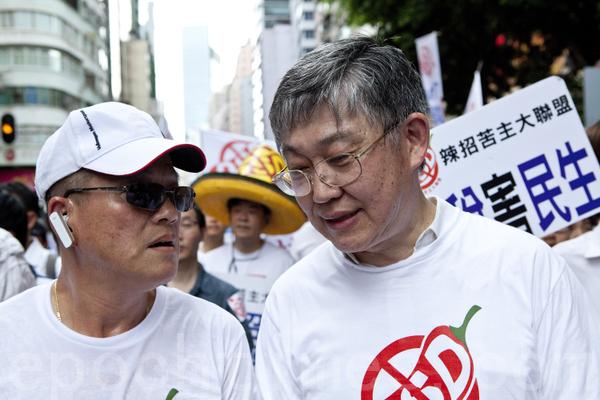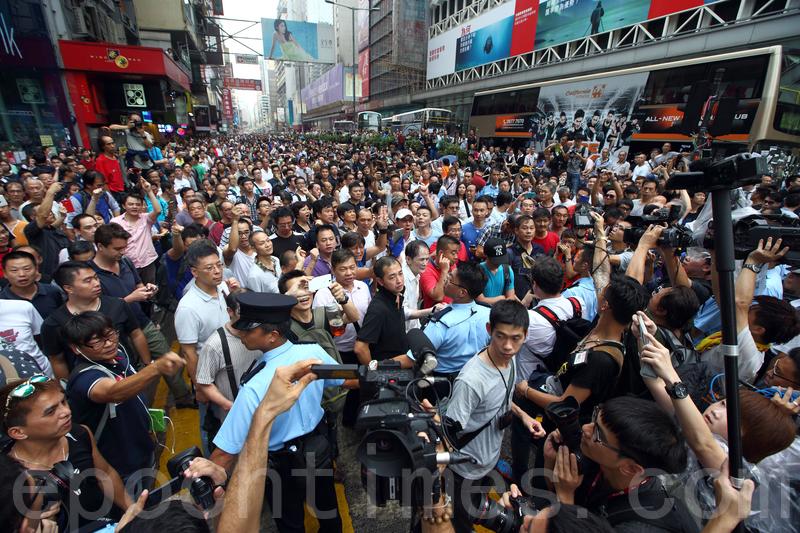HONG KONG—Another tycoon who made billions in Hong Kong is pulling up stakes, unhappy with the direction in which the city is heading.
Hong Kong’s leading property agent, the founder of Centaline Property, Shih Wing-ching has announced his intention to sell his properties, giving a shock to the Hong Kong property market. Whether Shih was influenced in this decision by an incident on July 30 in which two men blocked his car with theirs and then smashed his windshield with hammers is not known. Shih escaped unhurt and has said he does not know the reason for the attack.
Shih Wing-ching’s announcement follows upon the news earlier this month that Hong Kong Billionaire Li Ka-shing was putting his grocery store chain ParknShop up for sale and has apparently moved large amounts of money out of Hong Kong this past year. Observers of the Hong Kong business scene say Li’s sale of ParknShop is meant to send a message of his dissatisfaction with a deteriorating political and economic environment under the rule of chief executive Leung Chun-ying.
Rumors that Shih Wing-ching was selling out flared up in Hong Kong financial circles after Shih’s personal secretary called the company’s director saying Shih was selling all his properties. On Aug. 20, Shih confirmed the rumors and said the properties being sold represented 50 percent of his overall investments.
Shih Wing-ching intends to sell off units in the Convention Plaza Office Tower in Wan, Sun’s Group Centre;, Lippo Centre at Admiralty, Lippo Sun Plaza at Tsim Sha Tsui, Silvercord Tower and Millennium City at Kwun Tong etc, and many shops, including the unit rented out to the Post Office on Kwong Wa Street, Mong Kok with an asking price of HK$120 million. No prices are quoted for the rest of the properties but their overall worth is expected to exceed HK$1.5 billion (US$193 million).
Attacking Investment
In interviews, Shih Wing-ching has said the main reason he is selling is because he is not happy with the current social atmosphere in Hong Kong.
“Property investors are hated,” Shih said. “Why should I become a persecution target as a landlord?”
At the Landlord League Press conference on Aug 6 Shih Wing-ching said, “Leung Chun Ying’s double tough policy on property transfer taxes not only attacked property agents, it also spoiled the investment environment, seriously hurting industrial and commercial units.” On Feb. 22 Leung announced a doubling of the property transfer tax, targeting investors who want to buy a property to lease.
“Even Li Ka-shing has said he is retreating. It [the double tough policy on property transfer taxes] has a very serious effect on Hong Kong. Government should welcome investment, not attack investment,” Shih said.
Shih Wing Ching in his column in his newspaper AM730, titled “The hidden worry of the Hong Kong economy during the second half of the year,” showed pessimism about the market.
“The growth of the economy depends on the domestic market, exports, and investments,” Shih wrote. “Now there is a hidden worry about the domestic market, and exports are coupled with low overseas markets. But the market could be sustained with investments. But in recent years, Hong Kong people have shifted their hatred to merchants and the rich. Investment not only has not been encouraged, it is always under attack.”
Shih took as an example Manulife Insurance of Canada, which set up a regional headquarters in Hong Kong. They bought an office block and paid stamp duties of HK$380 million (US$49 million).
“Which other foreign company will be willing to make this type of investment in Hong Kong in the future?” he asked.
Shih Wing-ching said that not only should the economic growth of a place depend on property investment, but an attack on property investment would inevitably hurt a series of related fields and businesses.
“What I worry about is that as the negative effects surface, a downward trend could start, and a collapse might be triggered, like a landslide, resulting in irretrievable harm!”
According to data from Centaline Property, purchases and sales recorded in the first half of 2013 amounted to 7,497 transactions, a drop of 28.5 percent compared with 10,482 transactions in the second half of 2012.
In value terms transactions amounted to HK$89.511 billion in the first half of 2013 compared to HK$109.547 billion in the second half of 2012, a drop of 18.3 percent.
The director of Centaline Property (Industrial & Commercial Sector) Mr. Wong Wai-kei told the Epoch Times on Aug. 21 that there was a rise in the quantity of transactions with a drop in price in July. If the government does not revise its policy, the future of property agents is imperiled, he indicated:
“With fewer transactions and at least 20,000 agents working in the market now, down from a total number of licensed agents of 36,000, how could the current rate of 2,000 to 3,000 transactions per month sustain the livelihood of these people?”
“All big firms are urging promotional sales,” Wong Wai-kei said. “If business is in the red again in August, there will be a cut in staff and in scale, meaning that the overall property market in the second half of the year will be frozen.”
He also said that a lot of foreign investors are especially reluctant to buy offices.
Rich and Famous Selling
Smart Choice Property Agency Ltd’s director of the Industrial and Commercial Sector Mr Yao, told the Epoch Times, under the heavy-handed 3D policy, Industrial-Commercial transactions in North Point have dropped drastically from a monthly average of 17-18 transactions to a monthly average of 3-4 transactions. Under Leung Chun-ying, property sales are subject to the Buyer Stamp Duty (BSD), Special Stamp Duty (SSD), and Double Stamp Duty (DSD)—the so-called 3D policy.
Yao criticized the current policy of the government which greatly hinders the commercial and property sectors. “If somebody wants to invest in Hong Kong, but gets no bigger returns, I think they would be like Li Ka-shing and gradually turn to other investment projects,” he said.
According to people in the market, there have recently been a series of sales by celebrities, including Julian Hsu (vice president of the Henderson Group) selling The Arch at west Kowloon, and Brenda Chau Yuet-ching (socialite and barrister) selling The Masterpiece at Tsim Sha Tsui at a loss. These sales, and Shih Wing Ching selling his properties, and preferring cash in the transactions, may be symptoms of a big drop in the market.



